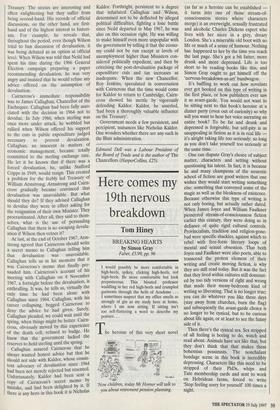Here comes my 19th nervous breakdown
Tom Hiney
BREAKING HEARTS by Simon Gray Faber, £5.99, pp. 96
I would possibly be more comfortable in high-heels, spikey, clicking high-heels, red high-heels. Be more comfortable but look preposterous. This bloated professor waddling in her red high-heels and crumpled garments through the hells of Academe ... I sometimes suspect that my office smells as strongly of gin as my study here at home, where I am now sitting. If sitting isn't too self-flattering a word to describe my posture...
The heroine of this very short novel Now children, today Mr Homer will talk to you about retirement pension planning. (as far as a heroine can be established it turns into one of those stream-of- consciousness stories where characters merge) is an overweight, sexually frustrated and alcoholic Charles Dickens expert who lives with her niece in a grey, dreary London. She's a miserable old boot with no life or much of a sense of humour. Nothing has happened to her by the time you reach the last page. She's got a bit fatter, more drunk and more depressed. Life is too short to be reading books like this, and Simon Gray ought to get himself off the `nervous-breakdown-as-arf bandwagon.
It's baffling to work out how novelists ever got hooked on this type of writing in the first place, or how publishers ever saw it as avant-garde. You would not want to be sitting next to this book's heroine at a dinner party (even out of curiosity) so why will you want to hear her voice narrating an entire book? To be fat and drunk and depressed is forgivable, but self-pity is as unappealing in fiction as it is in real life it's alright taking life too seriously; so long as you don't take yourself too seriously at the same time.
One can dispute Gray's choice of subject matter, characters and setting without questioning his talent. In fact, it is because he and many champions of the neurotic school of fiction are good writers that one wishes they would start writing something else; something that conveyed some of the magic as well as the bleakness of existence. Because otherwise this type of writing is not only boring, but actually rather dated. When James Joyce and William Faulkner pioneered stream-of-consciousness fiction earlier this century, they were doing so in defiance of quite rigid cultural controls. Provincialism, tradition and religion-gone- bad were specific shackles, against which to rebel with free-form literary loops of mental and sexual obsession. That both Joyce and Faulkner were also poets, able to transcend the protest element of their writing and create moving fiction, is why they are still read today. But it was the fact that they lived within cultures still dominat- ed by too tidy versions of right and wrong that made their messy-bedroom kind of writing so liberating. That is no longer true; you can do whatever you like these days (stay away from churches, burn the flag) and subsequently the avant-garde choice is no longer to be cynical, but to be curious about life again, or at least to see the funny side of it.
Then there's the cynical sex. Sex stripped of all feeling is boring to do, watch and read about. Animals have sex like that, but they don't think that that makes them bohemian pessimists. The nonchalant bondage scene in this book is incredibly depressing. Characters like this need to be stripped of their PhDs, whips and Tate membership cards and sent to work on Hebridean farms, forced to write `Stop feeling sorry for yourself 100 times a night.


























































 Previous page
Previous page